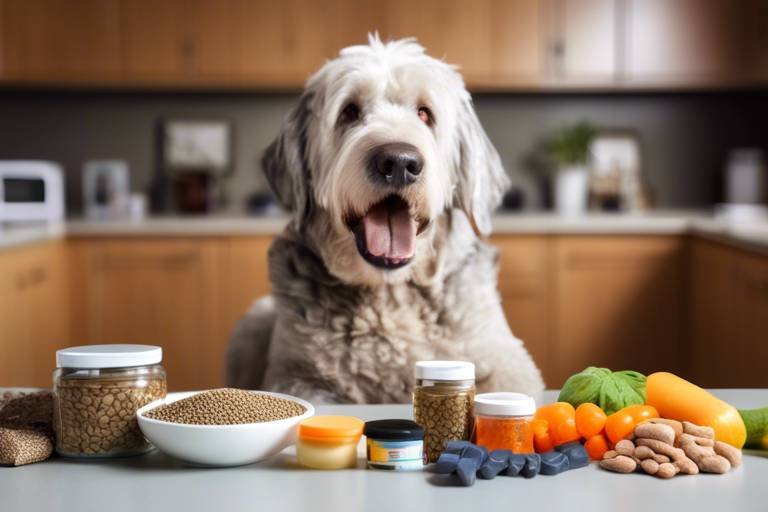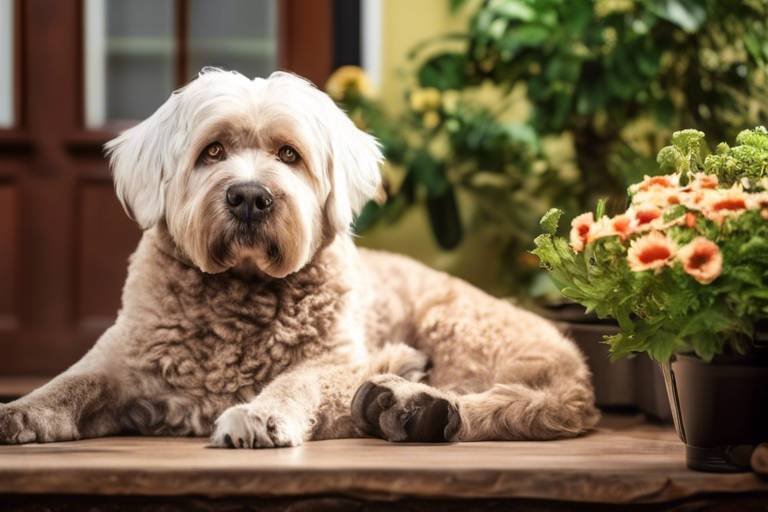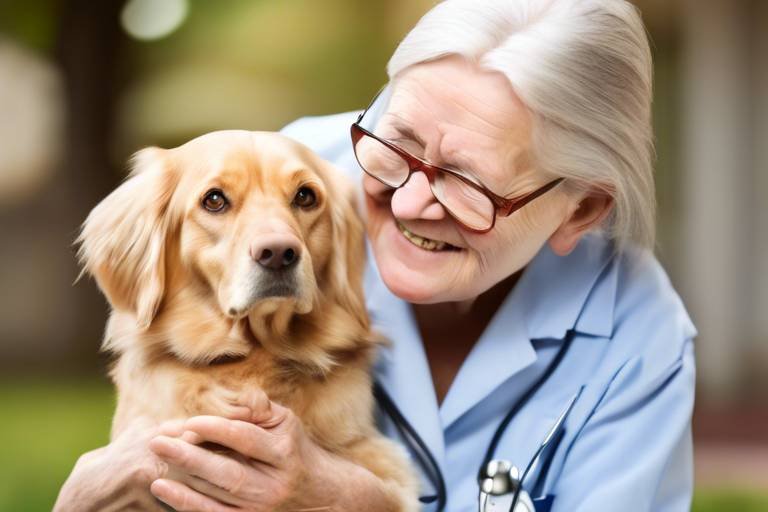The Best Home Remedies for Senior Pet Ailments
As our furry companions age, they deserve the utmost care and attention to ensure their golden years are filled with comfort and joy. This article explores effective home remedies to alleviate common ailments in senior pets, offering natural solutions that can improve their quality of life and overall well-being. Just like humans, pets can face a variety of health challenges as they grow older, and it’s essential to be proactive in addressing these issues. By understanding their needs and employing simple yet effective remedies, you can make a significant difference in their lives.
As pets age, they face unique health challenges. Understanding these challenges is crucial for providing the best care and implementing effective home remedies tailored to their needs. Senior pets may experience a decline in mobility, changes in appetite, and increased susceptibility to diseases. By being aware of these potential issues, pet owners can take steps to ensure their beloved companions remain happy and healthy. Regular veterinary check-ups are essential, but incorporating home remedies can enhance their quality of life significantly.
Senior pets often experience ailments such as arthritis, dental issues, and obesity. Identifying these conditions early can lead to better management and the use of appropriate home remedies. For instance, arthritis can lead to pain and stiffness, making it difficult for pets to move around comfortably. Dental issues can result in infections and discomfort, while obesity can exacerbate other health problems. By recognizing these ailments, you can take proactive measures to help your pet feel better.
Arthritis is a prevalent issue among older pets, often leading to discomfort and reduced activity levels. Home remedies like warm compresses and joint supplements can help ease discomfort and improve mobility. You might be surprised to learn that simple ingredients from your kitchen can provide relief. For example, turmeric is a natural anti-inflammatory that can be sprinkled on food, while omega-3 fatty acids from fish oil can help reduce joint pain. Gentle exercise routines, such as short walks or swimming, can also help maintain joint flexibility and overall health for senior pets suffering from arthritis.
Certain foods and herbs, such as turmeric and omega-3 fatty acids, can serve as natural anti-inflammatories, providing relief for arthritic pets without side effects. These ingredients not only help alleviate pain but also promote overall health. For instance, turmeric can be mixed with coconut oil to create a paste that can be applied to inflamed joints, while fish oil can be given as a supplement to enhance joint lubrication.
Incorporating gentle exercise routines, such as short walks or swimming, can help maintain joint flexibility and overall health for senior pets suffering from arthritis. Just like humans, pets need to stay active, but the key is to keep it gentle. Think of it as a leisurely stroll in the park rather than a sprint! Regular, low-impact activities can significantly improve their mobility while also providing mental stimulation.
Dental health is vital for senior pets. Home remedies like dental treats and homemade mouth rinses can help maintain oral hygiene and prevent serious dental issues. Just imagine the relief of having fresh breath and healthy gums! Regular brushing is essential, but if your pet is resistant, consider using dental chews or water additives that promote oral health. These simple solutions can make a world of difference.
Maintaining a healthy weight is essential for senior pets. Home remedies, including portion control and healthy snacks, can aid in weight management and overall health. Just like us, pets can struggle with weight as they age, and it’s crucial to keep an eye on their diet. A few extra pounds can lead to significant health issues, so being proactive is key. Monitoring portion sizes and providing healthy snacks can help keep their weight in check.
Adjusting your pet's diet to include more fiber and fewer calories can help manage their weight effectively. Consider incorporating fresh vegetables into their meals for added nutrition. Think of it as a colorful plate filled with goodies! Carrots, green beans, and sweet potatoes can be excellent additions that not only provide essential nutrients but also keep your pet feeling full without the extra calories.
Carefully monitoring portion sizes is crucial in preventing obesity in senior pets. Using measuring cups and feeding guidelines can help ensure they receive the right amount of food. It's easy to fall into the trap of "just one more treat," but those little extras can add up quickly. By being mindful of their portions, you can help your furry friend maintain a healthy weight and avoid the complications that come with obesity.
Many senior pets experience anxiety due to changes in their environment or health. Natural remedies, such as calming herbs and pheromone diffusers, can provide comfort and reduce stress. Just like us, pets can feel overwhelmed, and it's essential to create a soothing environment for them. Think of it as setting up a cozy retreat where they can feel safe and secure.
Herbs like chamomile and valerian root can be effective in soothing anxious senior pets. These natural remedies can help promote relaxation without sedation. Consider making a calming tea with chamomile and adding it to their water or food. It’s a gentle way to help them unwind after a stressful day.
Pheromone diffusers and sprays mimic natural calming scents that can help reduce anxiety in senior pets, making their environment more comforting and secure. These products are like a hug in a bottle, providing a sense of safety and comfort. By using them in your home, you can help ease your pet's anxiety and create a more peaceful atmosphere.
Proper hydration and nutrition are critical for the health of senior pets. Home remedies that encourage drinking and nutritious meals can significantly enhance their well-being. Just like us, pets need to stay hydrated to function at their best. You can make hydration fun by offering homemade broths or adding water to their meals. A well-nourished pet is a happy pet!
Making homemade broths can entice senior pets to drink more water, ensuring they stay hydrated. Adding low-sodium broth to their meals can also enhance flavor and nutrition. Imagine the joy on their face as they savor every bite! It's a simple yet effective way to keep them hydrated while also providing essential nutrients.
Preparing balanced homemade meals with high-quality ingredients can provide senior pets with essential nutrients, supporting their overall health and vitality. Think of it as cooking a gourmet meal for your furry friend! By including lean proteins, healthy fats, and plenty of vegetables, you can create delicious dishes that not only taste great but also promote longevity and vitality.
Q: What are some signs my senior pet may be in pain?
A: Look for changes in behavior, such as reluctance to move, whining, or changes in eating habits. If you notice any of these signs, it’s essential to consult your veterinarian.
Q: Can I use human food as home remedies for my pet?
A: Yes, many human foods can be beneficial, but always consult your vet before introducing new foods to ensure they are safe for your pet.
Q: How often should I take my senior pet to the vet?
A: Regular check-ups at least twice a year are recommended for senior pets to monitor their health closely.
Q: What are some safe exercise options for senior pets?
A: Gentle walks, swimming, and short play sessions are excellent ways to keep your senior pet active without overexerting them.

Understanding Senior Pet Health
As our beloved furry friends grow older, they enter a phase of life that brings unique health challenges. Understanding these challenges is crucial for providing the best care and implementing effective home remedies tailored to their needs. Just like humans, senior pets experience a range of changes in their bodies that can impact their overall well-being. From decreased energy levels to the onset of chronic conditions, being aware of these changes can help pet owners take proactive steps in caring for their aging companions.
One of the most significant factors affecting senior pet health is the natural aging process. As pets age, their metabolism slows down, and their bodies become less efficient at processing nutrients. This can lead to weight gain, which in turn can exacerbate other health issues. Additionally, senior pets are more prone to conditions such as arthritis, dental problems, and organ dysfunction. Recognizing these issues early on can make a substantial difference in managing their health effectively.
Another important aspect to consider is the emotional and psychological well-being of senior pets. Just like humans, pets can experience anxiety, depression, and cognitive decline as they age. Changes in their environment, such as moving to a new home or the loss of a companion, can significantly impact their mental health. Therefore, it's essential to create a stable and loving environment that addresses both their physical and emotional needs.
To help you better understand the common health challenges faced by senior pets, here’s a quick overview:
| Common Health Issues | Description |
|---|---|
| Arthritis | A degenerative joint disease that causes pain and stiffness. |
| Dental Disease | Gum disease and tooth decay that can lead to serious infections. |
| Obesity | Excess weight that can lead to other health complications. |
| Cognitive Dysfunction | A decline in mental function that can affect behavior and memory. |
By understanding these issues, pet owners can better advocate for their senior pets. Regular veterinary check-ups, a balanced diet, and appropriate exercise are critical in managing their health. Moreover, being attentive to any changes in behavior or physical condition can help catch potential problems early on, allowing for timely interventions.
In conclusion, understanding senior pet health is about more than just recognizing symptoms; it’s about fostering a holistic approach to their care. By being informed and proactive, pet owners can significantly enhance the quality of life for their aging furry friends, ensuring they enjoy their golden years with comfort and joy.

Common Ailments in Senior Pets
As our beloved furry companions age, they become more susceptible to a range of health issues that can significantly impact their quality of life. It's essential for pet owners to be aware of these common ailments so they can take proactive steps to manage them effectively. Senior pets often experience a variety of conditions, including arthritis, dental issues, and obesity. Recognizing these ailments early can lead to better management strategies and the implementation of appropriate home remedies that can provide relief and enhance their overall well-being.
One of the most prevalent issues among senior pets is arthritis. This degenerative joint disease can lead to pain, stiffness, and reduced mobility, making it difficult for pets to enjoy their usual activities. If you've noticed your pet struggling to get up or hesitating to jump onto their favorite spot, it might be time to consider some home remedies tailored to ease their discomfort. Regular check-ups with your veterinarian can also help in assessing the severity of the condition and determining the best course of action.
Another common ailment is dental disease. As pets age, they may develop tartar buildup, gingivitis, and other dental issues that can lead to pain and infection. Poor dental health not only affects their mouth but can also have serious implications for their overall health, including heart and kidney issues. Ensuring regular dental care and incorporating home remedies such as dental treats or DIY mouth rinses can help maintain their oral hygiene and prevent further complications.
Additionally, obesity is a growing concern for senior pets. With decreased activity levels and slower metabolisms, many older pets struggle to maintain a healthy weight. Obesity can lead to a myriad of health problems, including diabetes, heart disease, and joint issues. Therefore, it’s crucial to monitor their diet and exercise routines closely. A combination of portion control, healthy snacks, and regular gentle exercise can make a significant difference in managing their weight.
To summarize, here are the three most common ailments in senior pets:
- Arthritis: Causes pain and mobility issues.
- Dental Disease: Leads to oral pain and systemic health problems.
- Obesity: Increases the risk of various health complications.
By being vigilant and informed about these common ailments, you can take proactive measures to improve your senior pet's quality of life. Regular veterinary visits, coupled with effective home remedies, can help ensure that your furry friend enjoys their golden years to the fullest.
Q: How can I tell if my senior pet has arthritis?
A: Look for signs such as limping, difficulty getting up, reluctance to walk or play, and changes in behavior like increased irritability or hiding. If you notice these symptoms, consult your veterinarian for a proper diagnosis.
Q: What are some effective home remedies for dental care?
A: You can use dental chews, homemade mouth rinses with safe ingredients, and regular brushing to help maintain your pet's dental health. Always consult your vet before starting any new dental care routine.
Q: How much exercise should my senior pet get?
A: Gentle exercise is crucial for senior pets. Aim for short walks or light play sessions, adjusting the duration and intensity based on your pet's health and energy levels. Always consult your vet for personalized recommendations.
Arthritis Management
Arthritis is a common ailment that affects many senior pets, causing discomfort and restricting their mobility. As our furry friends age, their joints can become inflamed and painful, leading to a decline in their overall quality of life. Fortunately, there are several effective home remedies that can help manage arthritis in senior pets, allowing them to enjoy their golden years with more comfort and less pain.
One of the simplest and most effective ways to alleviate arthritis pain is by using warm compresses. Applying a warm towel or heating pad to your pet’s affected joints can help increase blood flow and reduce stiffness. This method is particularly beneficial during colder months when joint pain may worsen. Just be sure to test the temperature to avoid burns, and apply for about 15-20 minutes at a time.
In addition to warmth, joint supplements can play a vital role in managing arthritis. Supplements containing glucosamine and chondroitin are popular choices, as they help rebuild cartilage and improve joint function. Omega-3 fatty acids, found in fish oil, are also excellent for their anti-inflammatory properties. Incorporating these supplements into your pet’s diet can provide significant relief over time.
Another important aspect of arthritis management is ensuring your senior pet stays active, but in a gentle way. Gentle exercise routines, such as short walks or swimming, can help maintain joint flexibility and overall health. Swimming is particularly beneficial, as it allows pets to exercise without putting stress on their joints. Aim for 10-15 minutes of activity a few times a week, gradually increasing the duration as your pet becomes more comfortable.
To further enhance the effectiveness of these home remedies, consider including natural anti-inflammatories in your pet's diet. Foods and herbs such as turmeric, ginger, and green-lipped mussel extract can provide additional support in reducing inflammation. Here’s a quick overview of some natural anti-inflammatories:
| Natural Anti-Inflammatory | Benefits |
|---|---|
| Turmeric | Contains curcumin, which is known for its powerful anti-inflammatory properties. |
| Ginger | Helps reduce pain and inflammation while also aiding digestion. |
| Green-Lipped Mussel | Rich in omega-3 fatty acids, it supports joint health and reduces inflammation. |
In conclusion, managing arthritis in senior pets requires a holistic approach that combines warmth, supplements, gentle exercise, and a nutritious diet. By implementing these home remedies, you can help your beloved companion lead a more comfortable and active life. Remember, always consult your veterinarian before making significant changes to your pet’s care routine, especially if they are on medication or have other underlying health issues.
Q: Can I use over-the-counter pain relief for my pet?
A: It’s crucial to consult your veterinarian before giving any over-the-counter medications to your pet, as some human medications can be toxic to animals.
Q: How can I tell if my pet is in pain?
A: Signs of pain in pets can include limping, reluctance to move, vocalizations, changes in behavior, and decreased appetite. Always monitor your pet closely.
Q: Are there specific foods I should avoid for my arthritic pet?
A: Yes, you should avoid foods high in sugar and unhealthy fats, as they can contribute to inflammation and weight gain, worsening arthritis symptoms.
Natural Anti-Inflammatories
When it comes to managing arthritis and inflammation in senior pets, can be a game changer. Many pet owners are turning to holistic solutions that not only alleviate pain but also support overall health without the side effects often associated with conventional medications. One of the most celebrated natural remedies is turmeric, a spice known for its potent anti-inflammatory properties. Curcumin, the active compound in turmeric, has been shown to reduce inflammation and promote joint health, making it an excellent addition to your pet's diet.
Incorporating turmeric into your pet's meals can be as simple as mixing a small amount into their food. However, it's essential to pair it with black pepper, which enhances curcumin's absorption. A pinch of black pepper can significantly boost the effectiveness of turmeric, ensuring your furry friend gets the most benefits. Another fantastic option is omega-3 fatty acids, found in fish oil. These healthy fats are known for their anti-inflammatory effects and can help reduce joint pain and stiffness in senior pets. Adding a few drops of fish oil to their meals can make a world of difference.
It's important to note that while these natural remedies can be incredibly beneficial, they should be introduced gradually and in consultation with your veterinarian. Each pet is unique, and what works for one may not work for another. Additionally, some pets may require specific dosages or may have dietary restrictions that need to be considered. Always keep an eye on your pet's reaction when introducing new supplements or foods.
For a quick reference, here's a table summarizing some effective natural anti-inflammatories:
| Natural Anti-Inflammatory | Benefits | Usage Tips |
|---|---|---|
| Turmeric | Reduces inflammation, promotes joint health | Mix with food; combine with black pepper for better absorption |
| Omega-3 Fatty Acids | Reduces joint pain and stiffness | Add fish oil to meals; consult vet for dosage |
| Ginger | Reduces pain and inflammation | Use powdered ginger in meals; monitor for any digestive issues |
| Green Lipped Mussel | Supports joint health, contains omega-3s | Available in supplement form; follow dosage instructions |
Incorporating these natural anti-inflammatories into your senior pet's routine can lead to noticeable improvements in their comfort and mobility. However, always remember to pair these remedies with a balanced diet and regular veterinary check-ups to ensure your furry companion remains healthy and happy.
Q: Can I use turmeric for my pet every day?
A: Yes, turmeric can be used daily, but it's essential to consult your veterinarian for the appropriate dosage based on your pet's size and health condition.
Q: Are there any side effects of using omega-3 fatty acids?
A: Omega-3 fatty acids are generally safe, but some pets may experience digestive upset. Start with a small dose and monitor your pet's reaction.
Q: How can I tell if my pet is benefiting from these natural remedies?
A: Look for improvements in mobility, reduced pain during movement, and overall increased energy levels. Regular check-ups with your vet can also help track your pet's progress.
Gentle Exercise Routines
When it comes to keeping our senior pets healthy and happy, play a crucial role. Just like us, our furry companions need to stay active, but their exercise needs differ significantly from younger pets. Think of it as a cozy stroll through the park rather than a sprint to the finish line. The goal is not to tire them out but to keep their joints moving and their spirits high.
Short walks can be a fantastic way to engage your senior pet without overwhelming them. Aim for 15 to 20 minutes of leisurely walking, adjusting the pace to suit their comfort level. This not only helps maintain their joint flexibility but also offers them a chance to explore their surroundings, which can be exciting and stimulating. Consider taking a different route each time to keep things fresh and interesting.
Another gentle exercise option is swimming. Yes, you heard that right! Swimming is low-impact and incredibly beneficial for senior pets, especially those suffering from arthritis. It allows them to move freely without putting stress on their joints. If you have access to a dog-friendly pool or a safe body of water, let your pet enjoy a splash! Just make sure to supervise them closely and provide a life vest if they’re not strong swimmers.
Incorporating playtime into your pet's routine is equally important. Simple games, like tossing a soft toy or encouraging them to chase after a feather wand, can stimulate their minds and bodies. Remember to keep the play sessions short and sweet—around 5 to 10 minutes—to avoid fatigue. If your pet shows signs of tiredness, such as heavy panting or reluctance to continue, it’s time to call it a day.
Lastly, consider setting up a small obstacle course in your backyard or living room. Use soft cushions, low ramps, or even hula hoops for them to navigate. This not only provides physical activity but also challenges their mental agility. Just ensure all obstacles are safe and manageable for their abilities. You might find that they enjoy the challenge and excitement of a little adventure right at home!
To summarize, here are some gentle exercise routines that can benefit your senior pet:
- Short walks: 15 to 20 minutes at a comfortable pace.
- Swimming: Low-impact and joint-friendly.
- Playtime: Short sessions of engaging games.
- Obstacle courses: Fun and stimulating activities at home.
By incorporating these gentle exercise routines into your senior pet's daily life, you can help improve their mobility, enhance their mood, and contribute to their overall well-being. Remember, the key is to listen to their body and adjust the activities based on their comfort level. After all, every pet is unique, and what works for one may not work for another. So, get out there and enjoy some quality time with your furry friend!
Q: How often should I exercise my senior pet?
A: Aim for gentle exercise most days of the week, but always adjust based on your pet's energy levels and health conditions.
Q: What signs indicate my pet is overexerted?
A: Look for heavy panting, reluctance to continue, or signs of pain. If you notice these, it’s best to stop the activity.
Q: Can all senior pets swim?
A: Not all senior pets are natural swimmers. Always supervise them near water and consider a life vest for safety.
Q: Are there any specific exercises I should avoid?
A: High-impact activities or those that require jumping should generally be avoided, as they can strain joints and muscles.
Dental Care Solutions
When it comes to our beloved senior pets, dental health is often an overlooked aspect of their overall well-being. Just like us, pets can suffer from dental issues such as plaque buildup, gum disease, and tooth decay, which can lead to serious health problems if not addressed. Fortunately, there are several effective home remedies that can help maintain their oral hygiene and keep their smiles bright.
One of the simplest and most effective solutions is the use of dental treats. These specially formulated treats are designed to reduce plaque and tartar buildup while freshening your pet's breath. Look for options that are specifically labeled as dental chews, as they often contain ingredients that promote oral health. However, be mindful of the calorie content, especially for senior pets who may need to watch their weight.
In addition to dental treats, creating homemade mouth rinses can be a game changer for your senior pet's dental care routine. A simple recipe involves mixing water with a small amount of baking soda or coconut oil. This mixture can help neutralize bacteria in your pet's mouth and reduce the risk of gum disease. Just be sure to consult your veterinarian before introducing any new remedies to ensure they are safe for your pet.
Another effective strategy is regular brushing of your pet's teeth. While it may seem daunting, getting your pet accustomed to tooth brushing at an early age can make a world of difference. Use a soft-bristled toothbrush and toothpaste formulated for pets, as human toothpaste can be harmful. Aim for at least two to three brushings a week to keep their teeth and gums healthy.
Furthermore, consider incorporating water additives into your pet's drinking water. These additives help to reduce plaque and tartar buildup and are easy to use. Simply add the recommended amount to your pet's water bowl, and let them drink as usual. This simple addition can significantly improve their oral hygiene without requiring much effort on your part.
To sum it all up, maintaining your senior pet's dental health doesn't have to be a chore. By combining dental treats, homemade mouth rinses, regular brushing, and water additives, you can create a comprehensive dental care routine that will keep their teeth healthy and their breath fresh. After all, a happy pet is a healthy pet, and their smile is worth every effort!
- How often should I brush my senior pet's teeth? It's recommended to brush your pet's teeth at least two to three times a week for optimal dental health.
- Can I use human toothpaste for my pet? No, human toothpaste can be harmful to pets. Always use toothpaste specifically formulated for pets.
- Are dental treats effective for senior pets? Yes, dental treats can help reduce plaque and tartar buildup, but be mindful of their calorie content.
- What should I do if my pet has bad breath? Bad breath can be a sign of dental issues. Consult your veterinarian for a proper examination and treatment.

Weight Management Strategies
Maintaining a healthy weight is crucial for senior pets, as excess weight can lead to a myriad of health issues, including diabetes, joint problems, and heart disease. Just like us humans, our furry friends can struggle with their waistlines as they age. So, what can we do to help them shed those extra pounds? Well, there are several effective home remedies and strategies that can make a significant difference in your pet's weight management journey.
One of the most effective strategies is portion control. It's easy to overfeed our pets, especially when those big, pleading eyes are staring up at us. To combat this, consider using measuring cups to ensure you’re giving them the right amount of food based on their size and activity level. It's also helpful to refer to feeding guidelines provided on pet food packaging, as these can give you a good starting point. Remember, every pet is unique, so adjustments may be necessary.
Another fantastic approach is to incorporate healthy snacks into their diet. Instead of reaching for those calorie-laden treats, why not opt for fresh fruits and vegetables? Foods like carrots, green beans, and apple slices (without seeds) can be excellent low-calorie options that not only satisfy their cravings but also provide essential nutrients. Just imagine your pet crunching happily on a carrot stick instead of a high-fat treat!
In addition to diet, homemade diet adjustments can play a significant role in weight management. By preparing meals that are rich in fiber and low in calories, you can help your senior pet feel full without the extra calories. Consider adding ingredients like pumpkin or sweet potatoes to their meals, as they are not only nutritious but also help in digestion. These natural ingredients can serve as a great base for any homemade pet food you might prepare.
To illustrate the impact of portion control and diet adjustments, take a look at the table below, which compares standard pet food portions with healthier homemade alternatives:
| Type of Food | Standard Portion Size | Homemade Alternative Portion Size |
|---|---|---|
| Dry Kibble | 1 cup | ¾ cup + ¼ cup of vegetables |
| Canned Food | 1 can | ½ can + ½ cup of cooked pumpkin |
| Treats | 5 treats | 1 small carrot or apple slice |
Lastly, it’s essential to remember that monitoring portion sizes isn’t just about what you feed your pet, but also how often you feed them. Instead of giving them free access to food all day, consider establishing a structured feeding schedule. This not only helps with weight management but can also create a sense of routine that many pets find comforting.
By implementing these weight management strategies, you can help your senior pet lead a healthier, more active life. After all, a healthy weight can significantly improve their quality of life, keeping them playful and happy for years to come!
- What are the signs my senior pet is overweight? Look for difficulty in movement, excessive panting, or a noticeable lack of energy. A quick visual check can also help; you should be able to feel your pet's ribs without excess fat covering.
- How can I tell if I’m feeding my pet the right amount? Consulting with your veterinarian can provide tailored advice based on your pet's specific needs, age, and health conditions.
- Are there specific foods I should avoid for my senior pet? Yes, high-calorie treats, foods high in sugars or fats, and human food that can be toxic (like chocolate, grapes, and onions) should be avoided.
Homemade Diet Adjustments
When it comes to the health of our senior pets, dietary adjustments can make a world of difference. As pets age, their metabolism slows down, and their nutritional needs change. This means that what worked for them in their younger years may no longer suffice. One of the most effective ways to support their health is by incorporating homemade meals into their diet. Not only can this help manage their weight, but it also allows you to control the quality of ingredients they consume.
To start, consider increasing the fiber content in their meals. Fiber is essential for digestive health and can help your pet feel full without adding too many calories. Foods such as pumpkin, sweet potatoes, and green beans are excellent sources of fiber that are also low in calories. You can easily mix these into their regular meals, ensuring they get the nutrients they need without the extra weight.
Additionally, it’s crucial to reduce calorie intake by cutting back on high-calorie treats and opting for healthier alternatives. Instead of store-bought snacks that are often loaded with preservatives, why not prepare your own? For example, you can make simple treats using oats and peanut butter or freeze small pieces of fruit like blueberries or banana slices. These not only provide a nutritious boost but also serve as a tasty reward for your furry friend.
Another beneficial adjustment is to ensure that your pet’s meals are well-balanced. A balanced diet should include:
- Proteins: Lean meats such as chicken, turkey, and fish.
- Carbohydrates: Whole grains like brown rice or quinoa.
- Fruits and Vegetables: Fresh produce for vitamins and minerals.
- Healthy Fats: Sources like fish oil or flaxseed oil to support skin and coat health.
To help you visualize a balanced homemade meal, here’s a simple table outlining a sample recipe:
| Ingredient | Quantity |
|---|---|
| Lean Chicken Breast | 1 cup (cooked and shredded) |
| Brown Rice | 1/2 cup (cooked) |
| Carrots | 1/4 cup (steamed and chopped) |
| Green Beans | 1/4 cup (steamed and chopped) |
| Fish Oil | 1 tsp |
By preparing meals like this, not only are you providing your senior pet with essential nutrients, but you are also fostering a deeper bond through the act of cooking for them. Remember, the key is to make gradual changes to their diet to avoid any digestive upset. Always consult with your veterinarian before making significant alterations to your pet's diet to ensure it aligns with their specific health needs.
In summary, can be a game-changer for senior pets. By focusing on fiber-rich foods, reducing calories, and ensuring a balanced diet, you can help your furry friend maintain a healthy weight and improve their overall quality of life. After all, a happy pet often starts with a healthy plate!
Monitoring Portion Sizes
When it comes to caring for our senior pets, is one of the most critical aspects of their diet. Just like us, as pets age, their metabolism slows down, and they may not require as many calories as they did in their younger years. Overfeeding can lead to obesity, which brings about a host of health issues, including diabetes, heart disease, and joint problems. So, how can you ensure your furry friend is getting the right amount of food?
First, it’s essential to understand the recommended daily caloric intake for your pet's specific breed, size, and health condition. Most pet food packaging provides guidelines based on weight, but these are just starting points. You should always consult your veterinarian to tailor a feeding plan that suits your senior pet’s unique needs. For instance, if your pet has been diagnosed with a specific health issue, your vet can provide personalized advice on how much to feed.
One effective method for monitoring portion sizes is to use measuring cups or a kitchen scale. This ensures that you’re not guessing how much food to serve. You might be surprised at how easy it is to overfill a bowl without realizing it! By measuring out the food, you can stick to the recommended serving sizes and avoid the temptation to give them "just a little more." Additionally, consider dividing their meals into smaller portions throughout the day. This not only helps control their calorie intake but can also aid in digestion and keep their energy levels stable.
Another useful tip is to keep a food diary. You can jot down what your pet eats each day, including treats, which can quickly add up in calories. This practice will help you see patterns and adjust their portions accordingly. If you notice that your pet is gaining weight, it might be time to reassess their diet and portion sizes. Remember, it’s not just about cutting back; it’s about providing the right nutrition!
To further assist you, here’s a quick reference table for monitoring portion sizes:
| Pet Weight (lbs) | Daily Caloric Intake (kcal) | Recommended Portion Size (cups of dry food) |
|---|---|---|
| 5-10 | 200-350 | 1/2 - 1 |
| 11-20 | 350-600 | 1 - 2 |
| 21-50 | 600-1200 | 2 - 4 |
| 51+ | 1200+ | 4+ |
In conclusion, monitoring portion sizes is an essential practice for ensuring the health and longevity of your senior pet. By being diligent about their diet, using proper measuring techniques, and regularly consulting with your veterinarian, you can help your furry friend maintain a healthy weight and enjoy their golden years to the fullest.
- What should I do if my senior pet is overweight? Consult your veterinarian for a tailored weight loss plan that may include diet adjustments and increased exercise.
- How often should I feed my senior pet? It’s generally recommended to feed senior pets smaller, more frequent meals to aid digestion.
- Can I give my senior pet treats? Yes, but be mindful of the calories in treats and factor them into their daily caloric intake.

Natural Remedies for Anxiety
Many senior pets experience anxiety due to various factors, such as changes in their environment, health issues, or even the loss of a companion. As pet owners, it’s heartbreaking to see our furry friends stressed and uneasy. Thankfully, there are several natural remedies that can help soothe their anxious minds and promote a sense of calm. Instead of resorting to medications that may have unwanted side effects, consider these gentle, holistic solutions to help your pet feel more secure.
One of the most effective ways to combat anxiety in senior pets is through the use of herbal calming agents. Herbs like chamomile and valerian root have been known for their soothing properties. Chamomile, for instance, can help reduce anxiety and promote relaxation without causing sedation. You can brew chamomile tea and offer it to your pet in small amounts or find herbal supplements that contain these ingredients. Valerian root is another excellent option, known for its ability to alleviate stress and anxiety. When using any herbal remedy, it’s always a good idea to consult your veterinarian to ensure it’s safe for your pet.
Another fantastic solution is the use of pheromone products. These products mimic the natural calming scents that pets produce, providing a comforting atmosphere for them. Pheromone diffusers and sprays can be particularly effective in creating a serene environment. Simply plug in a diffuser in the area where your pet spends most of their time, and let the calming scents work their magic. You may also want to consider pheromone collars, which can provide continuous relief as your pet moves around the house.
In addition to herbal remedies and pheromone products, creating a calming environment at home can significantly help reduce anxiety levels in senior pets. This can include setting up a cozy, quiet space with their favorite blankets and toys, away from loud noises and disturbances. Consider playing soft music or using white noise machines to drown out any sudden sounds that may startle them. Remember, a little extra love and attention during stressful times can go a long way in making your pet feel safe and secure.
To further enhance the effectiveness of these natural remedies, it’s crucial to establish a consistent routine for your senior pet. Animals thrive on routine, and knowing what to expect can help alleviate anxiety. Try to maintain regular feeding times, exercise schedules, and playtime. This predictability can provide a sense of security for your pet, making them less anxious overall.
In conclusion, managing anxiety in senior pets can be achieved through a combination of natural remedies, environmental adjustments, and consistent routines. By incorporating these strategies into your pet's daily life, you can help them navigate their golden years with less stress and more comfort. Always remember to consult with your veterinarian before introducing any new remedies or changes to your pet's routine to ensure their safety and well-being.
- What are the signs of anxiety in senior pets? Look for behaviors such as excessive barking, hiding, pacing, or destructive actions. Changes in appetite or sleeping patterns can also indicate anxiety.
- Are natural remedies safe for all pets? While many natural remedies are generally safe, it’s essential to consult with your veterinarian, especially if your pet has underlying health issues or is on medication.
- How long does it take for natural remedies to work? The effectiveness of natural remedies can vary. Some pets may show improvement within a few days, while others may take weeks to respond. Patience and consistency are key.
- Can I use multiple remedies at once? Yes, combining different natural remedies can be effective, but always consult your veterinarian to ensure they are compatible and safe for your pet.
Herbal Calming Agents
When it comes to easing anxiety in our senior pets, can be a game-changer. Imagine a soothing cup of chamomile tea after a long day—this is what these herbs can do for your furry friends! Just like us, pets can feel overwhelmed by changes in their environment or health, and these natural remedies can help restore their sense of calm.
One of the most popular herbs for calming pets is chamomile. Known for its gentle sedative properties, chamomile can help reduce anxiety and promote relaxation. You might be surprised to learn that it can be administered in various forms, including teas or even as a tincture. Just a few drops of chamomile tincture in your pet's water bowl can make a noticeable difference in their demeanor.
Another effective herb is valerian root. Often referred to as nature's tranquilizer, valerian root has been used for centuries to alleviate stress and anxiety. It works by increasing the levels of gamma-aminobutyric acid (GABA) in the brain, which helps to calm the nervous system. You can find valerian root in capsules or as a tincture, and it can be a fantastic addition to your pet's routine, especially during stressful situations like thunderstorms or vet visits.
While these herbs are generally safe, it's always best to consult with your veterinarian before introducing any new supplement to your pet's diet. They can provide guidance on proper dosages and ensure that there are no contraindications with any medications your pet may be taking.
In addition to chamomile and valerian root, there are other calming herbs you might consider, such as:
- Lavender: Known for its soothing scent, lavender can help reduce anxiety when diffused in the air or applied topically in diluted form.
- Passionflower: This herb can promote relaxation and has been shown to help with anxiety and insomnia.
- St. John's Wort: While primarily known for its mood-lifting properties in humans, it can also assist in reducing anxiety in pets.
Ultimately, the goal is to create a tranquil environment for your senior pet. Incorporating these herbal calming agents into their daily routine can help ease their anxiety and improve their overall quality of life. Think of it as creating a cozy, safe haven where they can feel secure and relaxed, much like a warm hug after a stressful day.
Pheromone Products
Pheromone products have emerged as a popular solution for alleviating anxiety in senior pets, and for good reason! These products work by mimicking the natural scents that pets produce, which can create a sense of calm and security in their environment. Imagine walking into a room filled with the comforting aroma of your favorite childhood memories; that’s how pheromones can affect your furry friend. They help to reduce stress levels, making it easier for older pets to cope with changes in their surroundings or health conditions.
There are several types of pheromone products available on the market, including diffusers, sprays, and collars. Each type serves a specific purpose, and choosing the right one can significantly impact your pet's well-being. For instance, diffusers are great for providing continuous calming scents throughout a room, while sprays can be used for targeted relief in specific situations, such as during a vet visit or when introducing a new pet. Collars, on the other hand, offer a convenient option for on-the-go calming, releasing pheromones as your pet moves around.
When selecting a pheromone product, it’s crucial to consider your pet's specific needs. Some pets may respond better to certain types of pheromone delivery systems, and it might take a bit of trial and error to find the perfect fit. Additionally, it’s important to note that while pheromone products are generally safe, they should be used in conjunction with other anxiety-reducing strategies, such as providing a safe space or engaging in calming activities.
To help you better understand the different pheromone products available, here’s a quick comparison table:
| Product Type | Description | Best For |
|---|---|---|
| Diffusers | Plug-in devices that release calming pheromones into the air. | Long-term anxiety relief in a specific area. |
| Sprays | Portable sprays that can be applied to bedding or directly to the pet. | Situational anxiety, like vet visits or travel. |
| Collars | Wearable collars that continuously release pheromones. | On-the-go pets needing consistent calming support. |
Incorporating pheromone products into your senior pet's routine can create a more peaceful environment, ultimately enhancing their quality of life. Just remember, while these products can be effective, they are most beneficial when combined with other anxiety-reducing techniques, such as gentle exercise and a stable routine. So, why not give it a try? Your furry friend deserves a calm and comforting atmosphere!
- What are pheromones? Pheromones are natural chemical signals produced by animals that can influence the behavior of others of the same species.
- How long does it take for pheromone products to work? Many pet owners report seeing improvements within a few days, but it can vary depending on the individual pet and the severity of their anxiety.
- Are pheromone products safe for all pets? Yes, pheromone products are generally safe for use with pets, but it’s always best to consult with your veterinarian if you have concerns.
- Can I use pheromone products with other calming methods? Absolutely! Combining pheromone products with other techniques like training, exercise, and a stable routine can enhance their effectiveness.

Hydration and Nutrition
Proper hydration and nutrition are critical for the health of senior pets. As our furry friends age, their bodies undergo various changes, making it essential to adapt their diets to meet their evolving needs. Just like us, senior pets can experience a decline in their sense of thirst, which can lead to dehydration. To combat this, you can incorporate some simple yet effective home remedies that encourage them to drink more water and enjoy nutritious meals.
One effective strategy is to make homemade broths. These broths are not only delicious but also serve as a great way to entice senior pets to drink more. You can prepare a low-sodium chicken or beef broth by simmering the meat with vegetables like carrots and celery. The added flavor can make a significant difference in their hydration levels. Additionally, you can pour a bit of this broth over their regular food to enhance flavor and nutrition, turning mealtime into a more enjoyable experience.
Moreover, balanced homemade meals play a pivotal role in maintaining your senior pet's health. Preparing meals with high-quality ingredients ensures that they receive essential nutrients that support their overall well-being. For example, incorporating fresh vegetables like spinach, carrots, and peas can provide vitamins and minerals that are vital for their health. It's also important to include lean proteins such as chicken, turkey, or fish, which can help maintain muscle mass as they age.
| Ingredient | Benefits |
|---|---|
| Spinach | Rich in iron and vitamins A, C, and K; supports immune system. |
| Carrots | High in fiber and beta-carotene; promotes good vision. |
| Chicken | Lean protein source; helps maintain muscle mass. |
| Fish | Contains omega-3 fatty acids; supports joint health and reduces inflammation. |
When preparing your senior pet's meals, always keep in mind their specific dietary restrictions and preferences. It's also crucial to monitor their weight closely. Overweight pets can face additional health issues, so adjusting portion sizes and ensuring a balanced diet is key. You might want to consult with your veterinarian to create a tailored meal plan that suits your pet's unique needs.
In conclusion, focusing on hydration and nutrition can significantly enhance the quality of life for senior pets. By incorporating homemade broths and balanced meals into their diet, you can ensure they stay hydrated and receive the necessary nutrients to thrive in their golden years. Remember, a happy and healthy pet is a well-cared-for pet!
- How can I tell if my senior pet is dehydrated? Look for signs such as dry gums, lethargy, or a decrease in appetite. If you're unsure, consult your vet.
- What are some safe vegetables for senior pets? Vegetables like carrots, peas, and green beans are generally safe and nutritious for senior pets.
- How often should I feed my senior pet? It's best to feed smaller, more frequent meals to aid digestion and maintain energy levels.
- Can I give my pet human food? Yes, but ensure it's safe and healthy for pets. Avoid foods like chocolate, onions, and garlic.
Homemade Broths
Making for your senior pets is not just a fun kitchen project; it’s a fantastic way to boost their hydration and overall health. As our furry friends age, they often become less interested in drinking water, which can lead to dehydration and a variety of health issues. By creating flavorful broths, you can entice them to drink more while providing essential nutrients that support their well-being.
To get started, you’ll want to choose ingredients that are both safe and nutritious for your pets. A basic broth can be made using:
- Chicken or Beef Bones: These provide a rich flavor and are excellent sources of collagen, which supports joint health.
- Vegetables: Carrots, celery, and sweet potatoes are great additions that offer vitamins and minerals.
- Herbs: Parsley and thyme can add flavor while also providing health benefits, but avoid any herbs that may be toxic to pets.
Here’s a simple recipe to get you started:
Ingredients: - 2 pounds of chicken or beef bones - 1-2 carrots, chopped - 1-2 celery stalks, chopped - 1 tablespoon of parsley (optional) - 8 cups of water Instructions: 1. Place the bones in a large pot and cover with water. 2. Add the chopped vegetables and herbs. 3. Bring to a boil, then reduce to a simmer for 4-6 hours. 4. Strain the broth to remove solids and let it cool before serving.
Once your broth is ready, you can serve it as a nutritious drink or mix it into your pet's regular meals. This not only enhances the flavor but also provides a hydrating boost. Additionally, if your pet is feeling under the weather, a warm broth can be soothing and comforting, much like a warm bowl of soup for us when we're sick.
Remember to store any leftover broth in the refrigerator for up to a week or freeze it in ice cube trays for easy, portion-controlled servings. Just make sure to let it cool completely before storing, and always check for any bones or solid pieces before serving it to your pet.
Q: Can I use store-bought broth for my senior pet?
A: While store-bought broth can be convenient, it often contains high levels of sodium and preservatives that can be harmful to pets. Homemade broth is a healthier option and allows you to control the ingredients.
Q: Are there any ingredients I should avoid when making broth for my pet?
A: Yes, avoid using onions, garlic, and any herbs that are toxic to pets, such as certain types of mushrooms. Always research ingredients before adding them to your pet’s food.
Q: How often can I give my pet homemade broth?
A: You can offer homemade broth daily, but it should complement a balanced diet. It’s best to consult your veterinarian for specific recommendations based on your pet’s health needs.
Balanced Homemade Meals
When it comes to feeding your senior pet, quality matters more than ever. As pets age, their nutritional needs change, and it's essential to adapt their diet accordingly. A balanced homemade meal can be a game changer, offering not just sustenance but also the right nutrients to support their health. Think of it as crafting a gourmet meal tailored specifically for your furry friend!
First and foremost, a balanced diet for senior pets should include a mix of proteins, carbohydrates, fats, vitamins, and minerals. Proteins are crucial for maintaining muscle mass, which tends to decline with age. Consider lean meats like chicken, turkey, or fish, which can provide the necessary protein without excessive fat. Carbohydrates, such as sweet potatoes and brown rice, can offer energy, while healthy fats from sources like fish oil can help maintain a shiny coat and support joint health.
It's also vital to incorporate fresh vegetables into their meals. Vegetables like carrots, peas, and spinach are packed with essential vitamins and can boost your pet's immune system. However, be cautious with certain vegetables that are toxic to pets, such as onions and garlic. Always research before adding anything new to their diet!
To give you a clearer idea of what a balanced homemade meal looks like, here's a simple table:
| Ingredient | Benefits |
|---|---|
| Lean Meat (Chicken, Turkey, Fish) | High in protein, supports muscle health |
| Sweet Potatoes | Rich in fiber, aids digestion |
| Brown Rice | Good source of carbohydrates for energy |
| Carrots | High in vitamins, promotes eye health |
| Spinach | Loaded with antioxidants, supports overall health |
| Fish Oil | Omega-3 fatty acids, good for joints and skin |
When preparing these meals, remember to keep an eye on portion sizes. Senior pets often require fewer calories than their younger counterparts, so adjusting their portions accordingly is crucial. You might even want to consult with your veterinarian to determine the best meal plan tailored to your pet's specific needs and health conditions.
Incorporating a variety of ingredients not only keeps mealtime exciting for your pet but also ensures they receive a well-rounded diet. Just like us, pets can get bored with the same food day in and day out. So, feel free to experiment with different combinations to find what your senior pet enjoys the most!
Lastly, always pay attention to your pet's reactions to new foods. If you notice any signs of allergies or digestive issues, it's best to consult with a vet. After all, the goal of these balanced homemade meals is to enhance your senior pet's quality of life, not complicate it. So roll up your sleeves, get creative in the kitchen, and watch your furry friend thrive on the love and care you pour into their meals!
- What should I avoid when making homemade meals for my senior pet? Avoid ingredients that are toxic to pets, such as onions, garlic, chocolate, and grapes. Always research any new ingredient before adding it to their diet.
- How can I ensure my pet is getting all the necessary nutrients? Consulting with a veterinarian is the best way to ensure your pet's diet is balanced. They can provide guidance on portion sizes and necessary supplements.
- Can I use leftovers from my meals for my pet? While some leftovers can be safe, it’s important to avoid fatty, seasoned, or processed foods. Stick to plain, unseasoned meats and vegetables.
Frequently Asked Questions
-
What are some common ailments in senior pets?
As pets age, they often encounter issues like arthritis, dental problems, and obesity. Being aware of these ailments is essential for providing effective care and implementing suitable home remedies.
-
How can I manage my senior pet's arthritis at home?
There are several home remedies that can help manage arthritis in senior pets. Warm compresses can provide relief, while joint supplements and natural anti-inflammatories like turmeric and omega-3 fatty acids can also be beneficial.
-
What dietary changes can help with weight management in senior pets?
Adjusting your pet's diet to include more fiber and fewer calories can be key. Incorporating fresh vegetables into their meals can provide essential nutrients while helping to manage weight effectively.
-
Are there natural remedies for anxiety in senior pets?
Yes! Natural remedies like chamomile and valerian root can help soothe anxious pets. Additionally, pheromone diffusers can create a calming environment to reduce stress.
-
How can I ensure my senior pet stays hydrated?
Making homemade broths can encourage your pet to drink more water. Adding low-sodium broth to their meals not only enhances flavor but also promotes better hydration.
-
What are some effective dental care solutions for senior pets?
Maintaining dental health is crucial for senior pets. Consider using dental treats and making homemade mouth rinses to help keep their teeth clean and prevent serious dental issues.



















